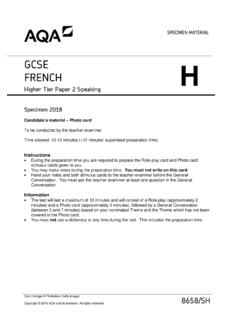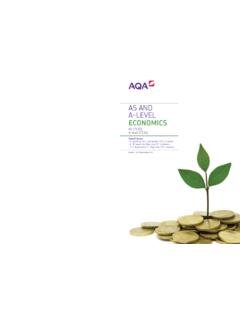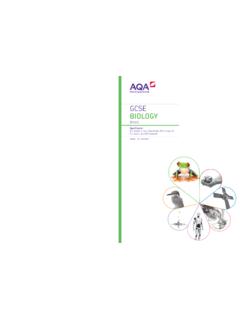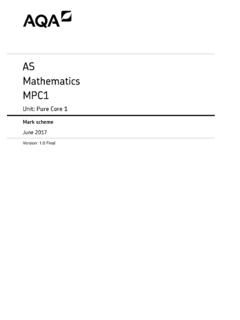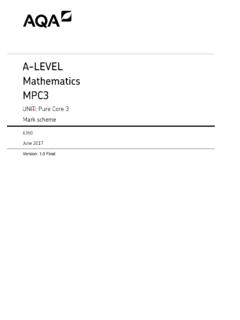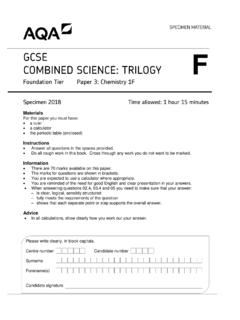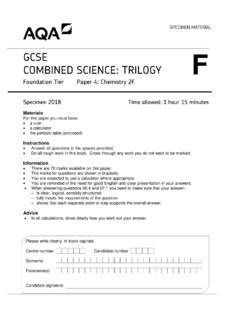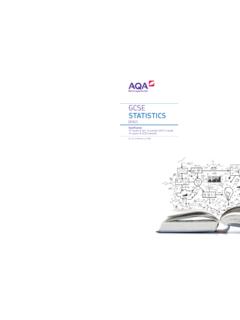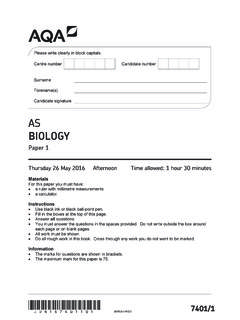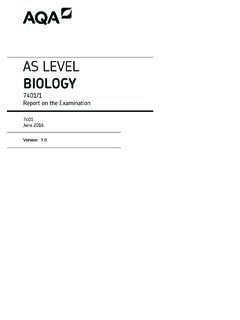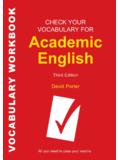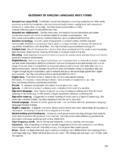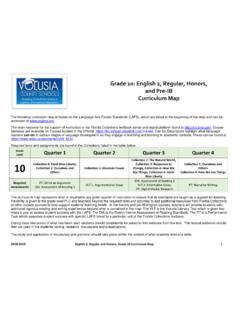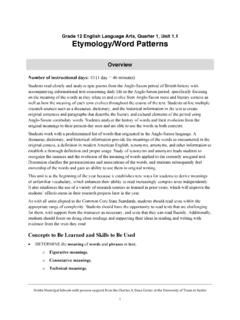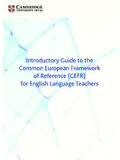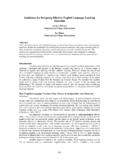Transcription of Teaching plan: Step Up to English and GCSE English …
1 Teaching plan: Step Up to English and GCSE English Language Introduction This resource is a suggested Teaching plan for a two and a half term ELC Step Up to English (5970) course running from September to May. It is based on our 1 Year Teaching plan for GCSE English Language (8700). This is a skills-based option which assumes progression to GCSE English Language level. Course guidance The course will start in September and students will complete their final Step up to English assessment after Easter to be submitted for moderation in May. Support students to access more difficult texts in the classroom through guided and shared reading activities (with peers). The curriculum is based on skills, rather than content and assessment only. Students gain reading skills alongside writing skills; you can link reading and writing thematically.
2 Show students how to recognise stylistic features and what language professional writers use. Encourage them to use similar techniques in their own writing. This can be achieved through activities like shared and guided reading. Students gain a wider range of skills than they need for the assessment. These are important life skills, which also link with GCSE. Teaching strategies DARTS sequencing, cloze, text marking, restructuring texts, true/false questions, card sorts, KWL grids (a table with three columns What do I already know? What do I want to know? What I have learned about this topic from reading the text?) modelling skimming, scanning, close reading guided reading guided writing shared reading shared writing. Resources Texts from AQA KS3 reading papers (Y7, Y8,Y9) AQA reading resource KS3 19th century texts AQA reading resource for GCSE Papers 1 and 2 which contains a selection of 19th, 20th and 21st century texts AQA e-library AQA Step Up to English schemes of work (one relating to each component of assessment) Encourage students to collect examples of emails, blogs, articles, reports, application forms, bookings, CVs, letters etc which interest them and use for classroom activities group work, 1.
3 1 work, as a stimulus for spoken language activities Collect examples of students work to show what good looks like or for proofreading, editing exercises Inter-Board GCSE Spoken Language DVD (new specification) Previous AQA GCSE Speaking and Listening standardising DVDs Texts from English Language Foundation Tier papers (legacy specification) Previous AQA Functional Skills English papers Work sheet resources published by Cambridge University Press and Harper Collins. Autumn term 1 Reading Writing Spoken Language Focus on GCSE Paper 1 and Step Up to English A selection of 20th or 21st century literature whole texts or extracts. Teaching for Step Up to English : Understanding what the text is about. Identifying the key ideas, characters and themes in a text.
4 Inference and deduction. Selecting interesting words and phrases and commenting on why the author has used these. Expressing an opinion about texts. Commenting on structure. Focus on GCSE Paper 1 Teaching for Step Up to English Writing a story (Component 2): Show examples to demonstrate what good looks like . Planning. Technical accuracy punctuation and grammar. Choice of effective vocabulary and sentence structures. Spelling patterns and conventions. Step Up to English Show examples of what good looks like . Teach: how to communicate ideas effective non-verbal communication, eye contact, intonation, pace etc features of Standard English . Focus on GCSE Paper 1 Section A (texts) The skills are needed for both papers, except for comparison on Paper 2.
5 DARTs activities identifying key points inference retrieval language analysis link to Teaching GCSE English Literature. Focus on GCSE Creative Writing Paper 1 Section B Writing to describe, narrate. Link thematically to reading texts. Focus on GCSE Teach: presentation skills structure planning. Autumn term 2 Reading Writing Spoken Language Focus on GCSE Paper 2 and Step Up to English A selection of 20th and 21st century non-fiction and literary non-fiction texts whole texts or extracts. Teaching for Step Up to English : Understanding what the text is about. Identifying the key ideas in a text. Inference and deduction. Selecting interesting words and phrases and commenting on why the author has used these. Comparing texts.
6 Focus on GCSE Paper 2 Teaching for Step Up to English Writing non-fiction (Component 1): Show examples to demonstrate what good looks like . Features of giving information and explanations. Planning. Structure, paragraphing. Technical accuracy punctuation and grammar. Choice of effective vocabulary and sentence structures. Spelling patterns and conventions. Step Up to English Show examples of what good looks like . Teach: how to ask open and closed questions listening skills how to respond appropriately to others structure. Focus on GCSE Paper 2 Section A (texts and skills, except for critical evaluation and structure, which are Paper 1 skills) critical evaluation analysis of language and structure. Focus on GCSE Paper 2 Section B Expressing a point of view Skills: argue persuade explain.
7 Link thematically to reading texts. Focus on GCSE Teach: structure planning questioning skills. Spring term 1 Reading Writing Spoken Language Focus on GCSE Paper 2 and Step Up to English A selection of 19th century non-fiction texts and literary non-fiction texts whole texts or extracts. Teaching for Step Up to English (you can also use 19th century literature texts): Understanding what the text is about. Identifying the key ideas in a text. Inference and deduction. Selecting interesting words and phrases and commenting on why the author has used these. Comparing texts. Focus on GCSE Paper 2 Teaching for Step Up to English Writing a story (Component 2): Show examples to demonstrate what good looks like . Technical accuracy punctuation and grammar.
8 Choice of effective vocabulary and sentence structures. Techniques to engage reader eg structure, openings and endings, twists and turns. Spelling patterns and conventions. Planning and writing in a specific time. Crafting writing by proof reading, editing and correcting. Step Up to English Teach: planning timing practise and reflect on own and each other s performance questioning. Focus on GCSE Paper 2 Section A (texts but skills are needed for both papers) DARTs activities identifying key points inference retrieval language analysis. Focus on GCSE Creative Writing Paper 1 Section B writing to a specific time planning crafting writing organising writing for impact. Focus on GCSE Teach: presentation questioning skills planning timing.
9 Spring term 2 Reading Writing Spoken Language Focus on GCSE and Step up to English Thematic approach 19th, 20th and 21st century extracts (non-fiction, literary non-fiction and literature texts). Teaching for Step Up to English : Understanding what the text is about. Identifying the key ideas in a text. Inference and deduction. Selecting interesting words and phrases and commenting on why the author has used these. Expressing an opinion about texts. Comparing texts. Commenting on structure. Focus on GCSE Paper 2 Teaching for Step Up to English Writing non-fiction (Component 1): Show examples to demonstrate what good looks like . Features of writing to give an opinion or express a point of view for a particular audience. Structure, paragraphing for effect.
10 Technical accuracy punctuation and grammar. Choice of effective vocabulary and sentence structures. Spelling patterns and conventions. Writing, proof reading checking, and editing in a time limit. Step Up to English Teach: working effectively in a small group how to present ideas at a meeting how to participate effectively by listening, asking and responding to questions the skills involved in chairing a meeting and keeping a record of decisions. Focus on GCSE Paper 2 Section A (texts) Synthesis and comparison are required in Paper 2; critical evaluation is required in Paper 1. Emphasis on: comparison synthesis evaluation. Focus on GCSE Paper 2 Section B Expressing a point of view Presenting a point of view linked to a theme.
